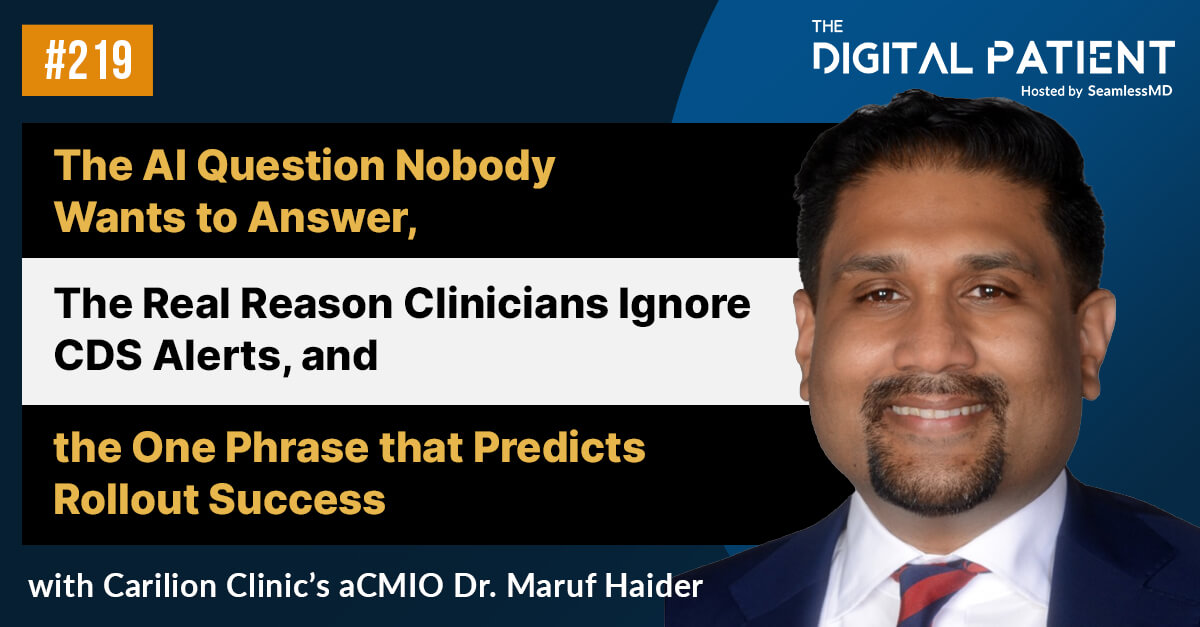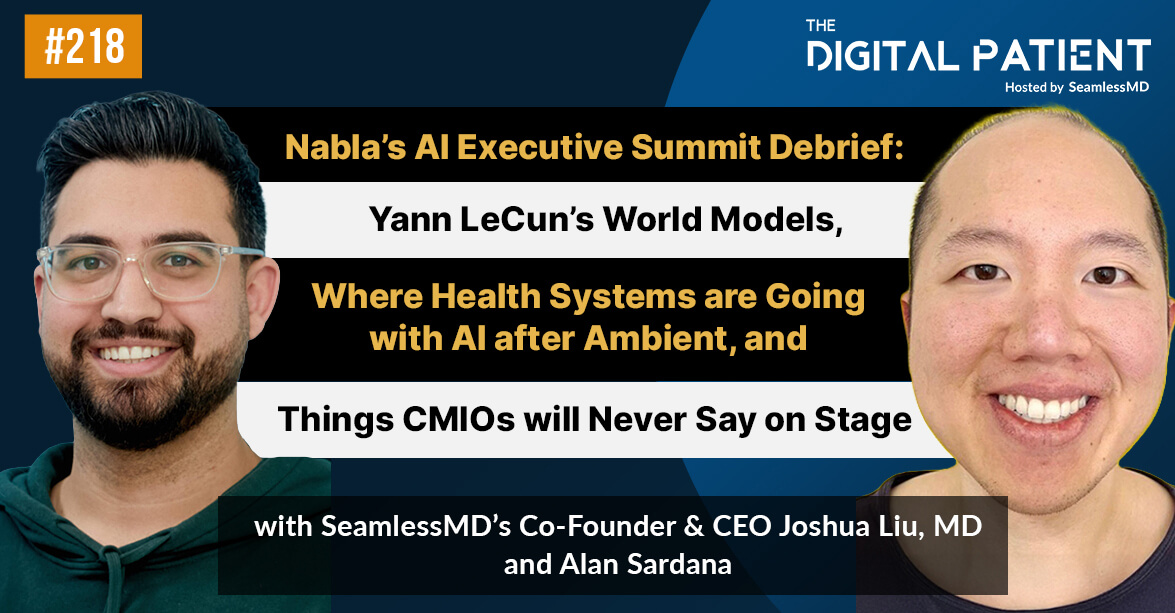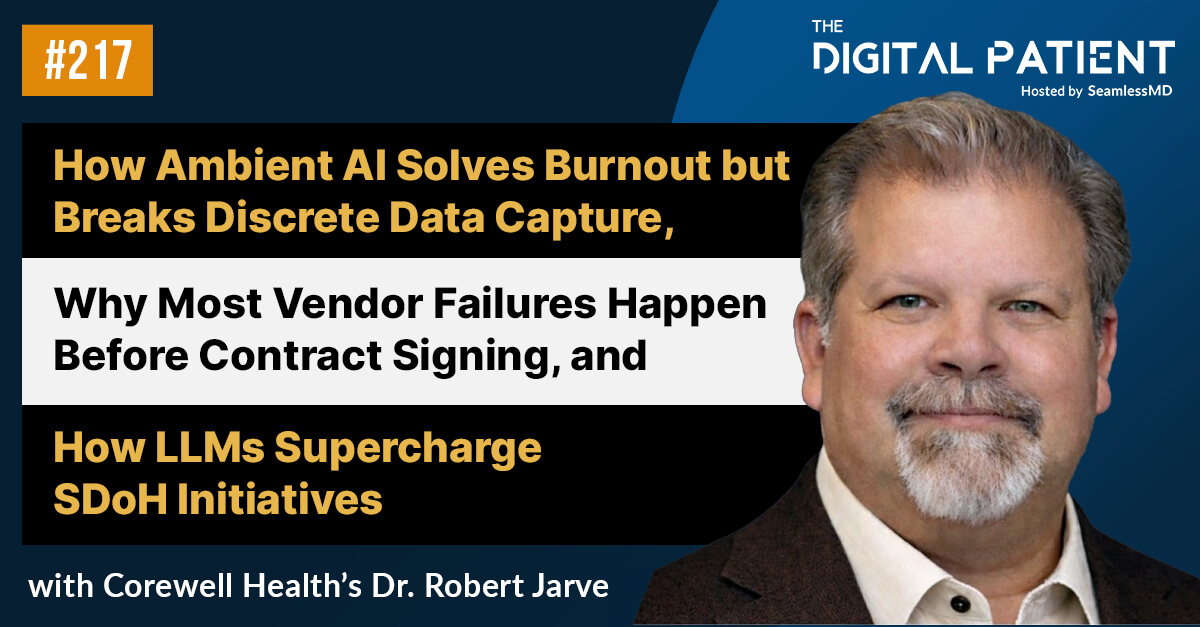Subscribe on: RSS | SPOTIFY | APPLE PODCAST | GOOGLE | BREAKER | ANCHOR
On this episode of "The Digital Patient" podcast, hosts Alan Sardana & Dr. Joshua Liu speak with Dr. Peter Pronovost, Chief Quality & Clinical Transformation Officer at University Hospitals, about "Leading With Love to Drive Innovation, Eliminating Value Defects Across a Health System, Implementing Enhanced Recovery Across 15 Service Lines During a Pandemic, and more..." Click the play button to listen or read the show notes below.
Audio:
Video:
Guest(s):
- Dr. Peter Pronovost (@PeterPronovost), Chief Quality & Clinical Transformation Officer at University Hospitals
- Dr. Joshua Liu (@joshuapliu), Co-founder & CEO at SeamlessMD
Episode 108 - Show Notes:
[00:02:00] How a personal tragedy motivated Dr. Pronovost’s journey into healthcare and patient safety, how his approach shifted towards problem-solving and designing systems for better patient outcomes, and how transdisciplinary research supports synthesizing diverse knowledge and pulling multiple levers to achieve substantial risk reduction;
[00:04:40] Why Dr. Pronovost views the fusion of evangelism and science as vital for successful large-scale changes, how “leading with love" drives innovation, the importance of maintaining a focus on keeping people healthy at home, and the model that was used to transform University Hospitals as measured by improved outcomes, financial stability, and enhanced access to care;
[00:14:48] How Dr. Pronovost implemented a four-part framework at UH that allows the system to auto-correct and operate efficiently and why he believes the success of a system lies in its ability to run itself without micro-management;
[00:15:45] Why adopting a problem-focused framework for connecting digital health to value in healthcare prioritizes solving problems rather than getting distracted by trendy technologies, and how Dr. Pronovost uses a four-part strategy to address the current labor constraints, which includes identifying work that can be stopped, automated, outsourced, or kept sacred at the bedside;
[00:20:20] Prevailing beliefs that Dr. Pronovost challenges such as overemphasizing technology rather than focusing on the problem, the false notion that technology alone can succeed without rigorous usability testing, and the reliance on pilots without a clear plan for scaling;
[00:25:40] Advice for physicians considering launching health tech startups;
[00:27:55] How Dr. Pronovost and the teams at UH seized the COVID crisis as an opportunity to roll out Enhanced Recovery After Surgery (ERAS) across 15 service lines, utilizing a fractal structure for coordination where each level had its own team and accountability, which allowed for rapid scaling, and how the system achieved impressive adherence rates, increasing from 25% adoption to around 80%, and ultimately reduced surgical length of stay from 6.2 days to 1.8 days, and significantly lowered complications, costs, and mortality across various service lines;
[00:30:30] Why Dr. Pronovost sets ambitious goals following the OKR methodology with shared accountability to foster a culture of learning and improvement, and how developing a prototype, followed by subsequent cohorts created an iterative process that allowed the team to learn, make improvements, and dramatically reduce cycle times as they progressed;
[00:32:31] Why Dr. Pronovost emphasizes the importance of thinking about scale from the very beginning of any project, challenging the academic mindset that is often focused on grants and publications, and stressing instead the ultimate goal of bringing the benefits of learning to patients, which requires scalability;
[00:34:10] Why Dr. Pronovost launched a podcast called Micro Moments with Peter, as he believes "micro moments" have a profound impact on clinical transformation and quality improvement; drawing from the work of psychologist, Barbara Fredrickson, he explains that love is manifested in these small moments of positive connection and resonance, such as empathetic patient interactions, supportive conversations with colleagues, and collaborative problem-solving sessions, and how these micro moments contribute to making healthcare better by showcasing their role in driving innovation and positive change;
[00:37:00] How Dr. Pronovost thinks about strategy for health systems to navigate the changing competitive landscape brought on by third parties such as Amazon and CVS, emphasizing four key priorities:
- Reduce bloated cost structures by targeting overhead, improving productivity, and eliminating waste and inefficiencies.
- Evolve care models from reactive and transactional to proactive and relational, ensuring seamless connections across the care continuum.
- Enhance access and patient experience by addressing the current challenges and inefficiencies in scheduling and appointment processes
- Maximize value by focusing on high-quality care that delivers superior outcomes and experiences, a crucial aspect in establishing competitive advantage
How Dr. Pronovost created Centers of Excellence at UH, where optimized protocols, comprehensive navigation, appropriateness criteria, and transparent outcomes result in enhanced value, appealing to both employers and payers;
Fast 5 / Lightning Round:
- What is your favorite book or book you’ve gifted the most?
"Multipliers" by Liz Wiseman and Greg McKeown
"Everybody Matters" by Bob Chapman and Raj Sisodia
... and the writings related to love and bringing love into the world by Thich Nhat Hanh
- Who is a person–dead or alive–you’d love to meet?
"The Buddha, Abraham Lincoln, Ronald Reagan, and Einstein"
- Would you rather have Super strength, super speed, or the ability to read people’s minds?
"Mind reading"
- What is something in healthcare you believe that others might find insane?
"That the secret to great healthcare is love."
- If you could travel back in time to any event or moment, what would it be and why?
The American Revolution, a time of great creativity and the establishment of fundamental principles of liberal democracy; the significance of these principles, despite the nation's failure to fully live up to them, particularly in relation to issues like slavery.
.svg)










.png)
